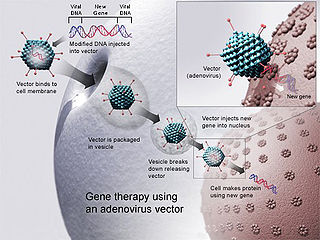
Gene therapy is a medical field which focuses on the utilization of the therapeutic delivery of nucleic acid into a patient's cells as a drug to treat disease. The first attempt at modifying human DNA was performed in 1980 by Martin Cline, but the first successful nuclear gene transfer in humans, approved by the National Institutes of Health, was performed in May 1989. The first therapeutic use of gene transfer as well as the first direct insertion of human DNA into the nuclear genome was performed by French Anderson in a trial starting in September 1990. It is thought to be able to cure many genetic disorders or treat them over time.

The Beckman Research Institute of City of Hope (BRI) is a not-for-profit medical research facility located at and partnering with the City of Hope National Medical Center in Duarte, CA, United States. It is dedicated to studying normal and abnormal biological processes which may be related to cancer, diabetes, HIV/AIDS and other life-threatening diseases. Both basic and clinical research are carried out in cooperation with the City of Hope National Medical Center. The institute itself is organized into more than 20 departments and divisions. As of 2019, the director is Steven T. Rosen. The Beckman Research Institute also hosts the Irell & Manella Graduate School of Biological Sciences whose founding dean was Arthur Riggs.

Cancer research is research into cancer to identify causes and develop strategies for prevention, diagnosis, treatment, and cure.

Professor John Shine is an Australian biochemist and molecular biologist. Shine discovered the nucleotide sequence, called the Shine-Dalgarno sequence, necessary for the initiation and termination of protein synthesis. He directed the Garvan Institute of Medical Research in Sydney from 1990 to 2011. In May 2018 Shine was elected President of the Australian Academy of Science.
Jerry McKee Adams, FAA, FRS is an Australian-American molecular biologist whose research into the genetics of haemopoietic differentiation and malignancy, led him and his wife, Professor Suzanne Cory, to be the first two scientists to pioneer gene cloning techniques in Australia, and to successfully clone mammalian genes.

Facioscapulohumeral muscular dystrophy (FSHD) is a type of muscular dystrophy (MD) that initially weakens the skeletal muscles of the face, scapula (scapulo) and upper arm (humerus). Muscle weakness usually develops in other areas of the body as well. Often weakness develops on one side of the body before the other. Symptoms typically begin in early childhood and become noticeable in the teenage years, with 95% of affected individuals manifesting disease by age 20 years. Up to 20% of affected individuals become severely disabled, requiring use of a wheel chair or mobility scooter. Life expectancy is generally not affected, except in rare cases of respiratory insufficiency. Non-muscular symptoms associated with FSHD include hearing loss and retinal blood vessel abnormalities.

Richard G. Pestell AO, FRACP, FACP, is an Australian oncologist and endocrinologist who is distinguished professor, Translational Medical Research, and the president of the Pennsylvania Cancer and Regenerative Medicine Research Center at the Baruch S. Blumberg Institute. He was previously executive vice president of Thomas Jefferson University and director of the Sidney Kimmel Cancer Center of Thomas Jefferson University, Philadelphia, US. Pestell was appointed an Officer of the Order of Australia in the 2019 Queen's Birthday Honours for distinguished service to medicine, and to medical education, as a researcher and physician in the fields of endocrinology and oncology.
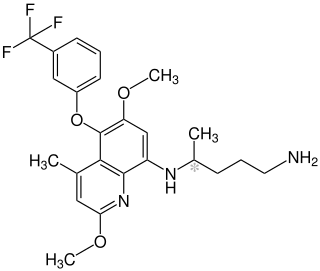
Tafenoquine, sold under the brand name Krintafel among others, is a medication used to prevent and to treat malaria. With respect acute malaria it is used together with other medications to prevent relapse by Plasmodium vivax. It may be used to prevent all types of malaria. It is taken by mouth.
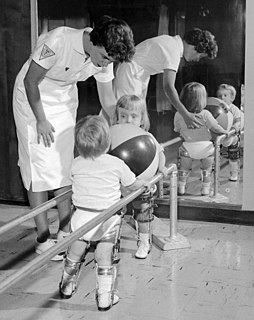
A therapy or medicaltreatment is the attempted remediation of a health problem, usually following a diagnosis.
Andrea Hilary Brand is the Herchel Smith Professor of Molecular Biology and a Fellow of Jesus College, Cambridge. She heads a lab investigating nervous system development at the Gurdon Institute and the Department of Physiology, Development and Neuroscience. She developed the GAL4/UAS system with Norbert Perrimon which has been described as “a fly geneticist's Swiss army knife”.

Douglas "Doug" James Hilton is an Australian molecular biologist. He is the Director of the Walter and Eliza Hall Institute of Medical Research in Melbourne, Australia and Head of the Department of Medical Biology at the University of Melbourne. His research has focused on cytokines, signal transduction pathways and the regulation of blood cell formation (hematopoiesis). Since 2014, Hilton has been the President of the Association of the Australian Medical Research Institutes (AAMRI).
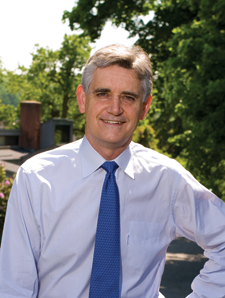
Bruce William Stillman, AO, FAA, FRS is a biochemist and cancer researcher who has served as the Director of Cold Spring Harbor Laboratory (CSHL) since 1994 and President since 2003. He also served as the Director of its NCI-designated Cancer Center for 25 years from 1992 to 2016. During his leadership, CSHL has been ranked as the No. 1 institution in molecular biology and genetics research by Thomson Reuters. Stillman's research focuses on how chromosomes are duplicated in human cells and in yeast Saccharomyces cerevisiae; the mechanisms that ensure accurate inheritance of genetic material from one generation to the next; and how missteps in this process lead to cancer. For his accomplishments, Stillman has received numerous awards, including the Alfred P. Sloan, Jr. Prize in 2004 and the 2010 Louisa Gross Horwitz Prize, both of which he shared with Thomas J. Kelly of Memorial Sloan-Kettering Cancer Center, as well as the 2019 Canada Gairdner International Award for biomedical research, which he shared with John Diffley.
Annabelle Claire Bennett is the Chancellor of Bond University and a former Judge of the Federal Court of Australia.

The Centenary Institute of Cancer Medicine and Cell Biology, commonly referred to as the Centenary Institute or Centenary, is an Australian medical research institute located at the Camperdown campus of the University of Sydney, in Sydney, New South Wales. The research programs at Centenary focus on a diverse range of human health issues including cancer, cardiovascular disease, genetic diseases, immunology, infectious diseases and liver disease.
Brendan Scott Crabb PhD FAHMS FASM is an Australian microbiologist, research scientist and Director and Chief Executive Officer of the Burnet Institute, based in Melbourne, Victoria, Australia.
Rosetta Martiniello-Wilks is an Australian cancer researcher and the current president of the Australasian Gene and Cell Therapy Society. She is a senior lecturer in the School of Medical and Molecular Biosciences at the University of Technology Sydney (UTS) in Ultimo, Sydney, Australia. Martiniello-Wilks is a core member of the Centre for Health Technologies at UTS and head of the Translational Cancer Research Group in the School of Medical and Molecular Biosciences, Faculty of Science, UTS.
Pamela J. Russell is an Australian is an academic researcher of immunology, bladder and prostate research. Russell was awarded Membership of the Order of Australia (AM) for her research on prostate and bladder cancer in 2003.

John Michael Dwyer, AO is an Australian doctor, professor of medicine, and public health advocate. He was originally a Professor of Medicine and Paediatrics, then Head of the Department of Clinical Immunology at Yale University. Returning to Australia, he became Head of the Department of Medicine and the Clinical Dean at the University of New South Wales and Director of Medicine at Sydney's Prince of Wales Hospital, the University's major teaching hospital, for over twenty years. In retirement he is an Emeritus Professor of Medicine of the University. He founded the Australian Health Care Reform Alliance, and was the founding president of the Friends of Science in Medicine until 2019. He was appointed an Officer of the Order of Australia for his service to public health.
Colin Louis MastersMD is an Australian neuropathologist who researches Alzheimer's Disease and other neurodegenerative disorders. He is laureate professor of pathology at the University of Melbourne.
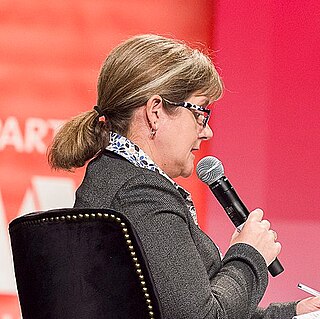
Marguerite Virginia Evans-Galea is the co-founder and CEO of Women in STEMM Australia. STEMM. Her research is focused on gene therapy and neurodegenerative diseases.













